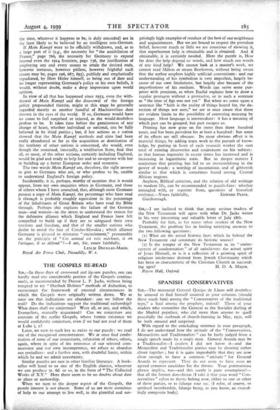THE GOSPELS RE-READ SIR,—In these days of crossword and jig-saw
puzzles, one can hardly read any considerable portion of the Gospels continu- ously, as recommended by Doctor L. P. Jacks, without being tempted to try " Sherlock Holmes " methods of deduction, to reconstruct the framework of external circumstances in which the Gospels were originally written down. We at once see that indications are abundant : can we follow the trail? Do the indications support the traditional authorship? What dates shall we conjecture? Were all, or any, and which, Evangelists, mutually acquainted? Can we conjecture any contents of the earlier Gospels, whose former existence we would confidently conjecture, even if we had not read of them at Luke i, x?
Later, we turn to such key as exists to our puzzle: we read one of the recognised commentators. We at once find confir- mation of some of our conjectures, refutation of others, others, again, where in spite of the eminence of our selected com- mentator and our own incompetence, we refuse to abandon our prejudices: and a further area, with doubtful limits, within which he and we admit uncertainty.
Similar puzzles are rare in other familiar literature. A book- seller will hand to us one of the English classics, whenever we can produce 35. 6d. or so, in the form of "The Collected Works of X.Y." Here there seem to be no doubts about date or place or authorship.
When we turn to the deeper aspect of the Gospels, the puzzle interest is not absent. Some of us are most conscious of help to our attempt to live well, in the plentiful and sur-
prisingly high examples of conduct of the best of our neighbours and acquaintances. But we are bound to respect the prevalent belief, however much or little we are conscious of showing it, that superhuman help is obtainable and is obtained. And if obtainable, it is certainly needed. Here the puzzle is, How far does the help depend or words, and how much can words of any kind help? We cannot look at a master's work, we cannot read Milton or strum Beethoven, without being aware that the author employs highly artificial conventions: and our understanding of his symbolism is very imperfect, largely be- cause of our own limitations, but largely also because of the imperfections of his medium. Words can serve some pur- poses with precision, as when Euclid explains how to draw a regular pentagon without a protractor, or in such a sentence as "the time of figs was not yet." But when we come upon a sentence like " faith is the reality of things hoped for, the de- tection of things not seen," we are at once aware that there are evident limits to the possibility of conveying meaning by language. Most language is intermediate: it has a meaning of which part can be grasped, but part escapes us.
Printing has now gone on for more than three hundred years, and has been prevalent for at least a hundred: but some of its effects are still obscure. Its most obvious effect is in material things, by adding team work to the pursuit of know- ledge, by putting in front of each research worker the sum total of existing discoveries and conjectures on his subject: so that human ingenuity in recent times has increased and is increasing in logarithmic ratio. But in deeper matters I conjecture that printing has led to an overconfidence in the power of words: a worship of incantations and of gibberish similar to that which is sometimes found among Central African negroes.
Anyhow, Biblical criticism, and the relation of old writings to modern life, can be recommended to puzzle-fans: whether entangled with, or separate from, questions of historical
SIR,—I am inclined to think that many serious readers of the New Testament will agree with what Dr. Jacks writes in his very interesting and valuable letter of July 28th.
Probably for him, as for many other readers of the New Testament, the problem lies in finding satisfying answers to the two following questions: (x) What are the actual historic facts which lie behind the New Testament t:nd constitute its historic source?
(2) Is the temper of the New Testament in its " under- current of condemnation " of all unbelievers the actual spirit of Jesus Himself, or is it a reflection of a growing spirit of religious intolerance derived from Jewish Christianity which has been so characteristic of the Christian Church in succeed-








































 Previous page
Previous page